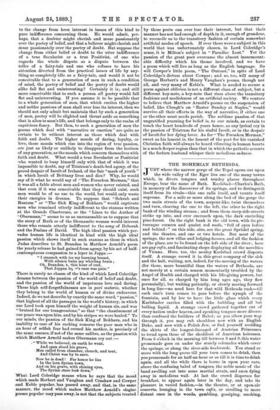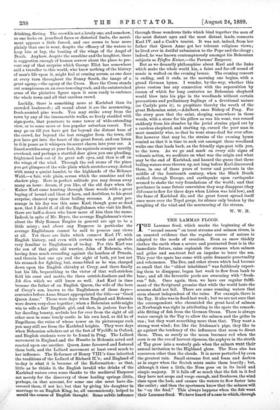THE BOHEMIAN BETHESDA.
J-HST where the narrow gorge of the Tepel opens out upon the wide valley of the Eger lies one of the many towns which, in divers tongues and sundry places throughout Europe, bear the name of Bath. Karlsbad—Charles's Bath, in memory of the discoverer of its springs, and to distinguish itself from its rivals—this one calla itself, and vaunts itself supreme. For a mile or more along the bed of the gorge the two main streets of the town, serpent-like, twist themselves and turn, cleaving the one to the left, the other to the right bank of the winding stream ; and from them steep side-streets strike up into, and ever encroach upon, the dark encircling pine-forest. On the right bank is the old town, with its pic- turesque corners and quaint red roofs, " full of eyes before and behind : " on this side, also, are the great Spriidel spring, and the theatre, and one or two hotels. But most of 'the springs, the new villas and lodging-houses, and all the fashion of the place, are to be found on the left side of the river ; here are gay cafes, and fascinating shops displaying all the novelties of Vienna. Here, too, the motley Karlsbad crowd disports itself. A strange crowd it is, this great company of the sick and the halt, waiting, not, indeed, for the moving of the waters (for these, more bountiful than the waters of Bethesda, are not merely at a certain season momentarily troubled by the Angel of Health and charged with his life-giving powers, but once for all, so charged by him long ages ago, they flow perennially), but waiting patiently, or slowly moving forward in long line—no need here for that wild Bethesda rash—till each one's turn comes to pass before the nymph of the fountain, and by her to have the little glass which every Karlsbader carries filled with the bubbling and all but boiling liquid. A strange crowd gathered together out of every nation under heaven, and speaking tongues more diverse than confused the builders of Babel; as you elbow your way through it, you may rub shoulders now with an English Duke, and now with a Polish Jew, or find yourself avoiding the skirts of the longest-lineaged of Austrian Princesses to tread upon those of the shoddiest of American heiresses. From 6 o'clock in the morning till between 8 and 9, this water promenade goes on under the stately colonades which cover the springs, or along the river-side boulevards. You stand or move with the long queue till your turn comes to drink, then you promenade for an half-an-hour or so till it is time to drink again, and all the while there is borne in upon your ears, above the confusing babel of tongues, the noble music of the band swelling out into some martial strain, and anon dying away in melodious wail. At last the crowd disperses for breakfast, to appear again later in the day, and take its pleasure in varied fashion,—in the theatre, or at open-air concerts, lounging in the town cafes, or strolling to more distant ones in the woods, gambling, gossiping, smoking,
drinking, flirting. The crowd is not a lovely one, and somehow, as one looks on jaundiced faces or distorted limbs, the merri- ment appears a little forced, and one seems to hear more plainly than one is wont, despite the efficacy of the waters to keep him at bay, the beating of the wings of the Angel of Death. Anyhow, despite the sunshine and the laughter, there is suggestion enough of human sorrow about the place to pre-. vent any of that surprise which George Eliot has somewhere said a traveller to this world, who knew nothing of the history of man's life upon it, might feel at coming across, as one does at every turn throughout the Sunny South, the image of a great agony,—the agony of the Cross. Here the Cross stands out conspicuous on an over-towering rock, and the outstretched arms of the plaintive figure upon it seem ready to embrace the whole town and all that careless crowd.
Luckily, there is something more at Karlsbad than its crowded boulevards ; all round about it are the murmuring, fresh-scented pine woods. • You may strike away from the town by any of the innumerable walks, so freely studded with sign-posts, that penetrate to some tower of wide-extending view, or to some more or less popular suburban resort. You may go on till you have got far beyond the distant hum of the crowd, far beyond the last straggler from the. town, till you have got into the heart of the great forest, and can listen to it in peace as it whispers its secret charm into your ear. A lizard scuttles away at your feet, the squirrels scamper merrily overhead, and perhaps a startled deer gives you one pleading, frightened look out of its great soft eyes, and then is off on the wings of the wind. Through the red stems of the pines you get glimpses of the wide plain which stretches away, dotted with many a quaint hamlet, to the highlands of the Blihmer Wald,—a fair, wide plain, across which the sunshine and the shadow play. Here in perfect solitude you may dream away many an hour : dream, if you like, of the old days when the Kaiser Karl came hunting through these woods with a great baying of hound and blast of horn, and doubtless, to his great surprise, chanced upon these boiling streams. A great per- sonage in his day was this same Karl, though gone so dead now, that I doubt if, of all the Englishmen who visit his Bath, there are half-a-dozen who know more of him than the name. Indeed, in spite of Mr. Bryce, the average Englishman's views about the Holy Roman Empire in general are apt to be a little misty ; and about any Emperor in particular the average Englishman cannot be said to possess any views at all. Yet there are links which connect Karl IV. with English history, and even with certain words and symbols very familiar to Englishmen of to-day. For this Karl was the son of that grim old warrior, John of Bohemia, who, having done much crusading against the heathen of Prussia, and therein lost one eye and the sight of both, yet lost not his stomach for fighting, but, stone-blind as he was, charged down upon the English chivalry at Crecy, and there finally lost his life, bequeathing to the victor of that well-stricken field his crest and motto, the three ostrich-feathers and the Ich diem which we still know so well. And Karl in time became the father of an English Queen, the wife of the hero of Orecy's son, known to the Englishmen of those days— centuries before Anne Stuart appropriated the title—as " Good Queen Anne." Those were days when England and Bohemia were drawn very close together; when a Bohemian noble might win to wife a fair English girl, and then, in jealous fear for her dazzling beauty, seclude her for ever from the sight of all other men in some lonely castle in his own land, as did he of Engelhaus, the ruins of whose tower on its picturesque rock you may still see from the Karlsbad heights. They were days when Bohemian scholars sat at the feet of Wycliffe in Oxford, and English students were to be found in Prag. The Lollard movement in England and the Hussite in Bohemia acted and reacted upon one another. Queen Anne favoured and fostered them both, and the Lollard movement at least owed much to her influence. The Reformer of Henry VIII.'s time inherited the traditions of the Lollard of Richard ll.'s; and England of to-day is what it is because of the Reformation : so that, little as he thinks it, the English invalid who drinks of the Karlsbad waters owes some thanks to the medheval Emperor not merely for the discovery of these healing springs (little, perhaps, on that account, for some one else must have dis- covered them, if not he), but that by giving his daughter in marriage to an English King, he, all unconsciously, helped to mould the course of English thought. Some subtle influence through those wondrous links which bind together the men of the most distant ages and the most distant lands, connects Karl IV. and a Cook's tourist. It was not, indeed, from her father that Queen Anne got her tolerant religious views.; he lived ever in dutiful submission to the Pope and the clergy ; indeed, he was known contemptuously amongst his Bohemian subjects as Pfafen Kaiser,—the Parsons' Emperor.
But as we dreamily philosophise about Karl and the links which make the whole world kin, a faint and far-off sound of music is wafted on the evening breeze. The evening concert is ending, and it ends, as the morning one begins, with a grand German hymn. I wonder, by-the-way, whether this pious custom has any connection with the superstition by reason of which for long centuries no Bohemian shepherd would blow into his pipe in the woodlands without certain precautions and preliminary fuglings of a devotional nature (as Carlyle puts it), to propitiate thereby the wrath of the great Bohemian saint,—Adalbert, once Bishop of Prag. For the story goes that the saint, sleeping somewhere in these woods, with a stone for his pillow as was his wont, was roused suddenly from his slumber by the jovial strains piped out by a careless shepherd, and starting up, cursed the poor man in most unsaintly wise, so that he went stone-deaf for ever after. But however that may be, the strains of the evening hymn remind us that it is time to seek out amongst these woodland walks one that leads back, as the friendly sign-post tells you, to the town. As we go and mark on every side signs of volcanic action, we meditate on what was the origin and what may be the end of Karlsbad, and hazard the guess that these boiling waters were thrown up, not long before Karl discovered them, in one of those years of terror and portents in the middle of the fourteenth century, when the Black Death stalked through Europe, and earthquake upon earthquake seemed to shake the very foundations of the world; and that perchance in some future convulsion they may disappear (they did cease to flow for three days when Lisbon was laid low), and the fame of Karlsbad die, and the great forest spread itself once more over the Tepel gorge, its silence only broken by the soughing of the wind and the murmuring of the stream.
W. W. H.



































 Previous page
Previous page